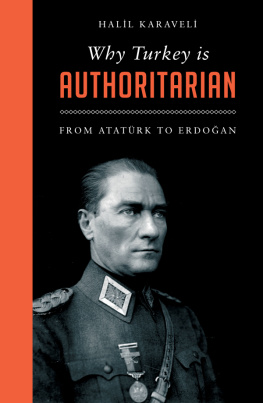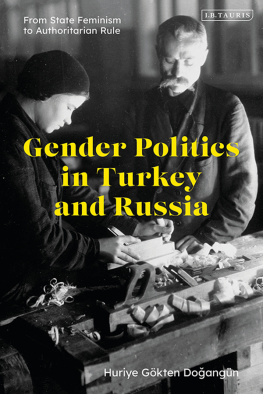Contents
Guide
Why Turkey is Authoritarian
Join the Left Book Club
Membership of the Left Book Club will give you at least four specially selected books each year, plus invitations to author events and discussion groups.
To join, please visit www.leftbookclub.com

Also available
A Peoples History of the Russian Revolution
Neil Faulkner
A Party with Socialists in It
A History of the Labour Left
Simon Hannah
Foreword by John McDonnell
Being Red
A Politics for the Future
Ken Livingstone
Syriza
Inside the Labyrinth
Kevin Ovenden
Foreword by Paul Mason
Student Revolt
Voices of the Austerity Generation
Matt Myers
Foreword by Paul Mason
Sound System
The Political Power of Music
Dave Randall
Cut Out
Living Without Welfare
Jeremy Seabrook
The Rent Trap
How We Fell Into It and
How We Get Out of It
Rosie Walker and Samir Jeraj
Why Turkey is Authoritarian
From Atatrk to Erdoan
Halil Karaveli

First published 2018 by Pluto Press
345 Archway Road, London N6 5AA
www.plutobooks.com
Copyright Halil Karaveli 2018
The right of Halil Karaveli to be identified as the author of this work has been asserted by him in accordance with the Copyright, Designs and Patents Act 1988.
The Left Book Club pays homage to the original Left Book Club founded by Victor Gollancz in 1936.
British Library Cataloguing in Publication Data
A catalogue record for this book is available from the British Library
ISBN 978 0 7453 3756 2 Hardback
ISBN 978 0 7453 3755 5 Paperback
ISBN 978 1 7868 0265 1 PDF eBook
ISBN 978 1 7868 0267 5 Kindle eBook
ISBN 978 1 7868 0266 8 EPUB eBook
This book is printed on paper suitable for recycling and made from fully managed and sustained forest sources. Logging, pulping and manufacturing processes are expected to conform to the environmental standards of the country of origin.
Typeset by Stanford DTP Services, Northampton, England
Simultaneously printed in the United Kingdom and United States of America
This book is dedicated to Saga Karaveli
Contents
Series Preface
The first Left Book Club (193648) had 57,000 members, had distributed two million books, and had formed 1,200 workplace and local groups by the time it peaked in 1939. LBC members were active throughout the labour and radical movement at the time, and the Club became an educational mass movement, remodelling British public opinion and contributing substantially to the Labour landslide of 1945 and the construction of the welfare state.
Publisher Victor Gollancz, the driving force, saw the LBC as a movement against poverty, fascism, and the growing threat of war. He aimed to resist the tide of austerity and appeasement, and to present radical ideas for progressive social change in the interests of working people. The Club was about enlightenment, empowerment, and collective organisation.
The world today faces a crisis on the scale of the 1930s. Capitalism is trapped in a long-term crisis. Financialisation and austerity are shrinking demand, deepening the depression, and widening social inequalities. The social fabric is being torn apart. International relations are increasingly tense and militarised. War threatens on several fronts, while fascist and racist organisations are gaining ground across much of Europe. Global warming threatens the planet and the whole of humanity with climate catastrophe. Workplace organisation has been weakened, and social democratic parties have been hollowed out by acceptance of pro-market dogma. Society has become more atomised, and mainstream politics suffers an acute democratic deficit.
Yet the last decade has seen historically unprecedented levels of participation in street protest, implying a mass audience for progressive alternatives. But socialist ideas are no longer, as in the immediate post-war period, in the tea. One of neoliberalisms achievements has been to undermine ideas of solidarity, collective provision, and public service.
The Left Book Club aspires to meet this ideological challenge. Our aim is to offer high-quality books at affordable prices that are carefully selected to address the central issues of the day and to be accessible to a wide general audience. Our list represents the full range of progressive traditions, perspectives, and ideas. We hope the books will be used as the basis of reading circles, discussion groups, and other educational and cultural activities relevant to developing, sharing, and disseminating ideas for change in the interests of the common people at home and abroad.
Timeline
1000 (ca.) Turkic tribes from Central Asia begin to enter Anatolia, the peninsula of which the present state of Turkey mostly consists.
1299 (ca.) The Turkic chieftain Osman founds the emirate that will later expand into the Ottoman Empire.
1838 The Ottoman government signs a free-trade agreement with Great Britain, soon followed by similar treaties with several other European states, that turns the Ottoman lands into an open market for European products, ruining local crafts and industry.
1839 Under the pressure of European powers, the Ottoman government declares the legal equality of all subjects, regardless of their religion.
1876 The Ottoman state becomes a constitutional monarchy.
1878 Sultan Abdlhamid II suspends the constitution and reinstitutes despotic rule.
1881 The former grand vizier (prime minister) Mithat Pasha, the author of the liberal constitution of 1876 and the first social and democratic reformer in Ottoman history, is put to death in his prison cell, likely on the orders of the Sultan Abdlhamid II.
1908 The Young Turk revolution. The constitutional order is restored and the parliament is reopened.
1914 The Ottoman Empire, ruled by the nationalist Young Turks, enters the First World War on the side of Germany and Austria-Hungary.
1915 The Armenian genocide. Around 1 million Ottoman Armenians are estimated to have been put to death by the Young Turk regime.
19191923 The Anatolian war: Turkish national forces led by Mustafa Kemal, later Atatrk, fight occupying Greek and French forces, but also the indigenous Greeks and Armenians of Anatolia.
1921 The leadership of Communist Party of Turkey is massacred, in all likelihood on the orders of the nationalist leader Mustafa Kemal.
1922 The Ottoman sultanate is abolished.
1923 The Republic of Turkey is founded. The entire Greek Orthodox population of Anatolia, over 1 million, is expelled from the new state of Turkey after an agreement between Turkey and Greece. Greece expels several hundred thousand Muslims to Turkey.
19371938 Tens of thousands of Kurds in the province of Dersim are massacred by the Turkish army and air force.
1950 The first free election is held. The conservative Democrat Party comes to power.
1960 Turkeys first military coup takes place.
1961 Parliamentary rule is restored.
1963 Workers are accorded collective bargaining rights and the right to strike.
1971 A right-wing military coup is staged to pre-empt a planned left-wing military coup.















